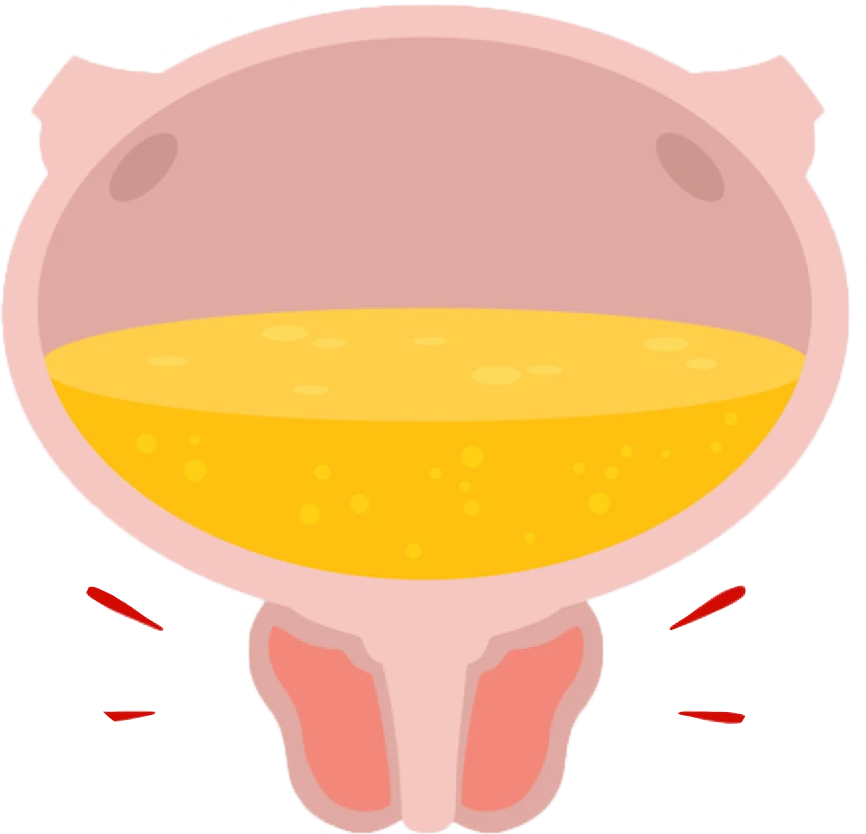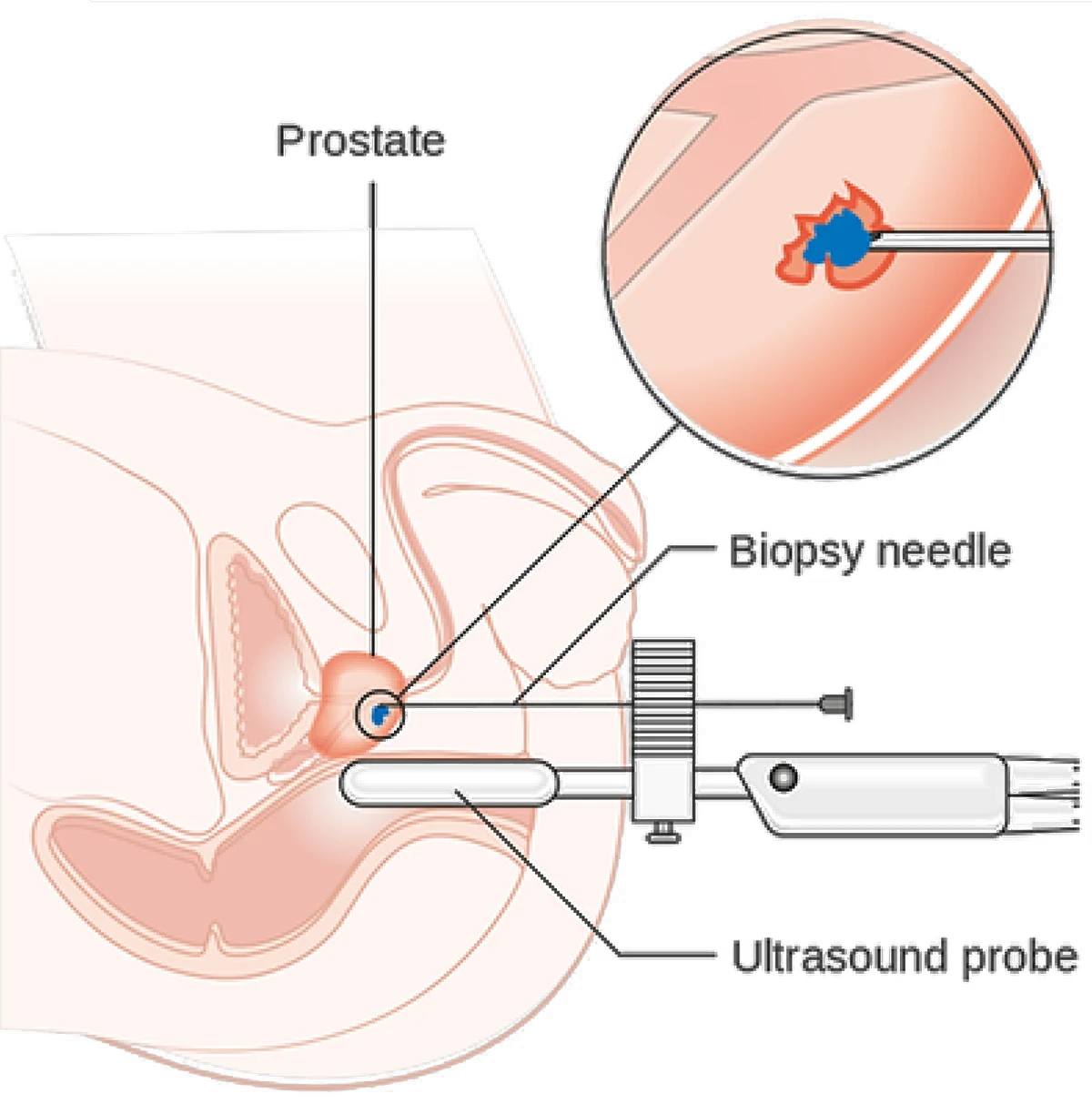- What is the prostate
- Why do I need a prostate biopsy?
- What is involved?
- What other equipment is used?
- Giving your consent
- What are the risks of having a template prostate biopsy?
- How do I prepare for my template prostate biopsy?
- Are there any alternatives to this biopsy?
- Will I have a local or a general anaesthetic?
- When you are at home
- Results
A Transperineal Template Prostate Biopsy is a diagnostic procedure used to determine whether cancerous cells are present in the prostate gland. This guide outlines its purpose, benefits, potential risks, and what you can expect before and after the procedure. Your care will be tailored to your specific clinical needs.

The prostate
The prostate is a small gland in males that produces seminal fluid. It is located at the base of the bladder and encircles the upper portion of the urethra, the tube that transports urine from the bladder out through the penis.
Why do I need a prostate biopsy?
This procedure enables Prof Lawrentschuk to determine whether your prostate contains cancerous cells. A biopsy may be recommended if:
- An MRI scan has revealed suspicious changes requiring further evaluation.
- Your PSA (prostate-specific antigen) levels are rising.
- A lump has been detected on physical (rectal) examination.
- A previous biopsy was negative, but PSA remains elevated.
- You have an existing prostate cancer diagnosis, and Prof Lawrentschuk requires additional information for planning or monitoring.
This procedure may also assist in diagnosing:
- Benign Prostatic Hyperplasia (BPH): Non-cancerous prostate enlargement
- Prostatitis: Inflammation of the prostate
- Prostatic Intraepithelial Neoplasia (PIN): Abnormal but non-cancerous cell changes
What is involved?
This biopsy is performed under general anaesthesia.
An ultrasound probe is placed into the rectum to guide the procedure. Tissue samples are collected through the skin between the scrotum and rectum (perineum) using a grid system to ensure multiple areas are sampled.

What other equipment is used?
The procedure may involve the use of an ultrasound probe as well as a flexible cystoscope.
The ultrasound probe is a small device inserted into the rectum to provide real-time imaging during the procedure. Whereas the flexible cystoscope is a fine camera that is used to pass through the urethra to check for blood clots and assess the prostate’s configuration. Any clots found are flushed out.
Giving your consent
Prof Lawrentschuk will explain the benefits and risks of the procedure. Once you are informed, you will be asked to sign a consent form. Please feel free to raise any questions before signing.
What are the risks of having a template prostate biopsy?
Difficulty passing urine (2% risk)
- Template prostate biopsies may cause internal bruising that can create difficulty in passing urine.
- If this happens, you may need a catheter and should visit your local Emergency Department.
- To prevent this, nurses will check that you can urinate before you go home, and if needed, you may be kept for observation.
- Very rarely, a temporary catheter may be passed after biopsy to allow the prostate to settle down.
Infection (1% risk)
- If you develop a fever, pain, or burning when urinating, you may have an infection.
- Contact Prof Lawrentschuk, his nurse, the hospital, or your GP if you experience symptoms.
Blood in urine or semen (common)
- Urine may appear pink or dark red and semen
- Drink plenty of fluids and avoid physical activities like heavy lifting and cycling especially if you notice blood in your urine.
- If bleeding is heavy or persistent please visit your local Emergency Department and tell them about your recent biopsy.
Allergic reaction - Some people may react to medications they have been given. Please inform us of any known allergies before your biopsy. How do I prep
How do I prepare for my template prostate biopsy?
You will be contacted 1–2 weeks prior to your scheduled procedure with specific fasting instructions and hospital admission details. You will also receive a link to complete your online admission forms.
It is important to advise the rooms if you are taking any blood thinners or any prescribed medications for diabetes or weight loss purposes. The rooms can be contacted on 03 9329 1197.
Are there any alternatives to this biopsy?
A prostate biopsy may also be performed by passing the biopsy needle through the rectum rather than through the skin. However, this approach has a higher risk of infection.
Will I have a local or a general anaesthetic?
The biopsy is performed under general anaesthetic, which is administered through a small needle in the back of your hand. You will be asleep and pain-free throughout the procedure.
Post-procedure, you may feel drowsy, nauseous, or unsteady. Avoid driving for at least 24 hours and ensure someone can accompany you home. A general anaesthetic takes at least 24 hours to wear off, so please rest during this period.
Some patients are given medication to help them pass urine. If these have been given to you, you will need to take them until they have finished.
When you are at home
For a few days after the procedure, you may experience:
- Discomfort or aching in the biopsy area.
- Bruising around the testicles.
- Blood in your urine.
- Pink or brown semen for up to six weeks (this is normal).
Please avoid heavy lifting/strenuous activity and drink plenty of non-alcoholic fluids during this period.
Contact the hospital or our rooms if you experience:
- Increased pain not relieved by Panadol or anti-inflammatory medications.
- A fever over 38°C.
- Inability to pass urine for over 8 hours.
- Heavy bleeding or large blood clots.
If you have any queries, please use the contact details below:
MONDAY to FRDAY 9AM–5PM
Call the rooms at 9329 1197
AFTER HOURS
Contact your local Emergency Department or please page Prof Lawrentschuk on 03 9387 1000.
Results
Your results will take up to a week to come back. Prof Lawrentschuk will call you with the results as soon as he has them and will advise you when to expect a call. Please make sure you have an appointment for the follow-up if that is requested at the time of results.
If you have any queries, please use the contact details below:
MONDAY to FRDAY 8:30AM–4:00PM
Call the rooms at 9329 1197
AFTER HOURS
Contact Epworth Emergency on 03 9426 6666 or Royal Melbourne Emergency on 03 9342 7000.
You can also page Prof Lawrentschuk on 03 9387 1000.
For appointments and enquiries:
CONSULTING LOCATIONS

